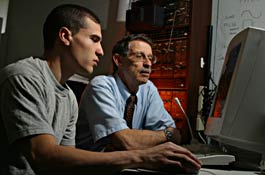Using sounds ranging from opening a can of Coke, drinking the soda, and crushing the can, to balloons, vacuum cleaners, and dumpsters, beginning electronic composition students record sounds around a theme, and then manipulate the sounds to become musical compositions under the guidance of William Melin, professor of music.
He takes non-music majors, some with no formal music training, and teaches them how to use synthesizers and computers to work with sounds to create pieces that are very interesting without worrying about technical musical constraints such as notation.
“You don’t recognize the individual sounds when you hear them in the finished piece,” says Melin, who joined the faculty in 1973. “By changing the pitch and rhythms, they become interesting as music.”
Several of his electronic music students have gone on to get graduate degrees in electronic music, a few have become professional musicians, and others work in the music field.
“You get people who really have an interest in your course here. I get many talented, creative people who may not be traditional musicians, but maybe played guitar in their garage. They aren’t musicians in the conventional sense, but musical creativity is not related to musical training.”
A former trumpet player, Melin has combined his teaching with performing in professional ensembles and conducting. He directed Lafayette’s chamber orchestra for almost 20 years. As the director, “you really get to know the students, which I enjoyed,” he says.
He also likes the freedom at Lafayette to teach a variety of music courses, not just his Medieval and Renaissance music specialty, which he says would not be true at conservatories or schools with large music departments. One such course is the January interim session jazz class that includes a week in New York City studying the music and listening to performances in the evening at jazz clubs. Another last semester was on Beethoven, in which students studied Beethoven’s music and delved into the mystery of who was Beethoven’s “Immortal Beloved,” whom he addressed in a letter found after his death.
“Of course, sometimes it’s a challenge to make the course interesting,” says Melin. “Students don’t grow up listening to classical music, or jazz for that matter.”
“Bill Melin permanently opened my ears,” says Tony Green ’83, an English graduate who is now a freelance writer and critic for such publications as Vibe, Spin, and Village Voice. “I would say he is largely responsible for the mindset that has helped me in my career as a music critic/writer. I remember one freshman-year class that dealt with the ‘what is music’ question. After he fielded all the responses, the usual rock-era ‘lyrics and chords’ stuff, he stopped and put on Miles Davis’ Bitches Brew. ‘What about this?’ he asked. ‘Is this music?’ I was completely floored, since I had never heard anything like that before. Then he put on a 12-tone contrapuntal composition by Milton Babbit. I missed my next class because I spent the next 20 minutes bugging him about the stuff he was playing.
“That lesson taught me that I loved avant-leaning music, and two, there is always something beyond what you know and are able to define, an idea that has guided nearly everything I write. I largely have Bill Melin to thank for that.”
“When I was at Lafayette, the music department was very small,” says Bar Scott ’80, an English graduate who is now a professional singer, songwriter, recording artist, and owner of Lucy Max Productions, a small record company. “Bill Melin was always full of such energy and love of the music that was in his head. He bounced around with such enthusiasm. His love of music reflected my own and I found that to be a lifesaver for me back then.
“My favorite class at Lafayette, and the one that has affected me the most in my professional music life since graduating, was a class on 20th-century music. It opened my heart, mind, and ears to a much wider understanding of music. The music and the class communicated to me the importance of expression and individuality. It taught me about artistic freedom and the value of music as personal expression. It encouraged me to think outside the box and to consider the truth that great music does not necessarily have to follow old forms. Bill Melin facilitated that class and I am forever grateful.”
Highlights
Publications: “The New York Jazz Experience: A Model for Experiential Learning,” presented with Prof. Larry Stockton at College Music Society International Conference, Limerick, Ireland, 2001; “Using Electro-acoustic Technology to Teach Beginning Composition Students,” presented at CMS annual meeting, 1995.
Honors: National Endowment for the Humanities summer seminar fellow, 1984; several Sloan Foundation grants.
Achievements: Head of music department 1981-1992; co-director of Chamber Orchestra and chamber music ensembles 1973-1991; led with Prof. Stockton “New York Jazz Experience” interim course 1986-present; directed and adjudicated Music Maestro Please music festivals 1984-present; member, Easton Mayor’s Advisory Committee on the Arts, 1994-2001.
Contact: (610) 330-5365, melinw@lafayette.edu

Bill Melin (right), professor of music, offers advice to Jon Apostoles ’03 on his electronic music composition.
